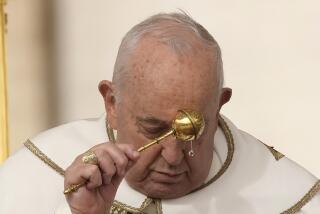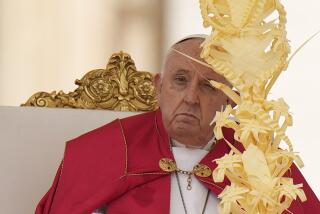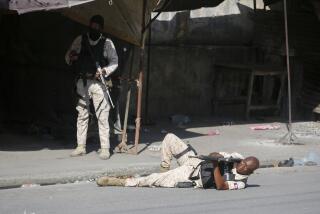Gunfire, Panic at Pope’s Chile Mass : Rock-Throwing Leftists, Police Clash in Worst Violence of Pontiff’s 33 Trips
The worst violence in Pope John Paul II’s 33 trips throughout the world erupted here Friday near the altar where the anguished pontiff prayed for peace and reconciliation in bitterly divided Chile.
Police fired shotgun pellets and tear gas at rock-throwing leftist demonstrators within 100 yards of the towering altar platform, triggering panic among thousands in the huge throng of worshipers at a downtown Santiago park where the Pope was celebrating the most solemn Mass of his Chilean visit.
The demonstrations against the dictatorship of military President Augusto Pinochet, coming midway through the Pope’s six-day visit to Chile, were by far the most violent to mar a papal trip since John Paul began his international pilgrimages in 1979.
Priest Rushes Demonstrators
Priests robed in white to serve Communion and volunteer papal parade marshals waded into the crowd in a futile attempt to calm bandanna-masked demonstrators, who had come armed with staves and rocks. One middle-aged priest rushed the demonstrators with fists flying.
The Pope appeared physically unaffected by the gas, but bishops seated near him on the red-carpeted platform were crying. As the Mass ended, the Pope clutched his face in his hands in obvious distress. Papal security aides rushed him away.
Friday night, police said 38 officers were injured, four of them seriously. The police reported three civilians wounded by gunshots--a Chilean journalist, a 21-year-old man and a 13-year-old boy. Witnesses said they saw at least 20 injured civilians being treated at the scene.
Ironically, the violence came only hours before the Pope was to celebrate what a Vatican official called a “historic” agreement among the country’s moderate and Marxist parties to forswear violence in their opposition to Pinochet and to respect Chile’s Christian traditions.
Well-Coordinated Protests
The protests, which appeared to have been well prepared and coordinated, began with bonfires at the southern entrance of O’Higgins Park. Protesters advanced quickly to within 100 yards of the pontiff, where a disciplined column of demonstrators hurled stones at the press stand flanking the altar.
Then they stormed it, overwhelming a thin line of yellow-vested papal marshals and Chilean national police. Quickly, a water cannon truck and black-and-white tear-gas trucks called “skunks” counterattacked, sending thousands of worshipers into flight. Shots were fired. On the fringes of the park, mounted police charged the demonstrators with clubs flailing.
Ignoring the tumult, the Pope distributed Communion from the altar to a patient line of worshipers.
Violence Not Shown on TV
A senior Vatican official said Friday night that John Paul was aware of the disturbances as he celebrated the Mass but made no subsequent comment about them. However, the violence was not seen by a nationwide television audience, and it was not clear if the Pope was aware of its severity as he urged Chileans to forswear “hatred, class war and reprisals.”
The Vatican official said church authorities began to suspect trouble when they noticed that loudspeaker cables on the south side of the park had been cut. As the demonstration developed, they said, the advancing protesters waved banners of the outlawed Chilean Revolutionary Left Movement. The spokesman, who praised police for defending the security fence near the altar, said the demonstrators apparently intended to create panic among the worshipers.
As the demonstrators advanced, they sang, “Juan Pablo, amigo, la guerra no esta contigo.” (“John Paul, friend, the war is not with you.”)
Injects Politics in Homily
The pontiff injected politics into his homily at the Mass, for the first time in his visit bluntly reminding Chileans of “the democratic tradition” that preceded the harsh military rule under which they have lived for the past 13 years.
Before Friday’s stunning violence, a senior Vatican official hailed the Pope’s achievement in drawing together mainstream Pinochet opponents from the Communist left, the political center and the conservative right. It is, he said, “historical and could be applied to other Latin American countries such as Colombia.”
“In a way, it is a kind of mediation by the Pope,” the official said. “Never before have these political leaders even consented to come together in the same room, much less sign the same commitment.”
The pontiff met Friday night with leaders of the Democratic Popular Movement, a Marxist grouping that includes the largest Communist Party in the hemisphere after Cuba’s, and 13 centrist and conservative parties that historically have claimed 80% of the Chilean electorate.
Before John Paul’s unprecedented intervention, the only common goal the group shared was that Pinochet must go.
Substantial Concession
For the Communists, the papal agreement appeared a substantial concession, since they have been generally credited with most of the country’s terrorism and have previously refused to join the centrist parties in denouncing violence.
At their surprise meeting with the Pope, added to his schedule only at the last minute, the widely disparate political leaders signed and submitted identical letters committing their respective groups to four basic principles: ethical political activity, a peaceful transition to democracy, the defense of life and human dignity, and respect for Chile’s Christian traditions.
“This is a propitious opportunity to reiterate our commitment before Your Holiness to develop political activity inspired in the ethical principles that are the basis of all human coexistence,” the letters affirmed, adding the groups’ commitment “to work for the defense of all human life and to promote the dignity of the person and the family, and to dedicate our effort to achieve national reconciliation and reach a peaceful transition to democracy.”
“Finally,” the letters concluded, “we desire to make plain before His Holiness that whatever our position may be regarding the Catholic religion, we respect the Christian tradition in which the majority of the Chilean people participate.”
Nun Beatified
The pontiff also broke with his usual custom of eschewing politics in his homily during the violence-punctuated Mass at the park, a “Mass of Reconciliation,” which included ceremonies beatifying an early 20th-Century Chilean nun, Sister Teresa de los Andes.
Addressing the hundreds of thousands gathered for the Mass, John Paul reminded those who could hear him in the tumult of the “recognized democratic tradition of the noble Chilean people.”
In a powerful sermon, the pontiff emphasized the issues of social and human justice, the common theme among anti-Pinochet forces in turbulent Chile.
‘Viva el Papa!’
The massed voices of the well-dressed crowd of worshipers responded with repeated cries of “Viva el Papa!”
“The search for a common good also requires the rejection of every form of violence and of terrorism--which throws people into chaos,” John Paul proclaimed, as demonstrators clashed with police near the altar.
“Reconciliation, as the church proposes it, is the genuine road to Christian liberation without recourse to hatred, to programmed class war, to reprisals, to the inhuman dialectic which does not see others as brothers, children of the same Father, but as enemies that must be fought,” the Pope continued.
“We do not tire of repeating everywhere that violence is neither Christian nor evangelical, nor is it the road to solve the real problems of individuals or peoples,” he said, with the violence raging nearby.
Pope Praises Bishops
Striking a particularly sensitive chord, in a dictatorship where the church has been the paramount defender of human rights, John Paul singled out Chile’s outspoken Catholic bishops for particular praise.
“I want to declare my backing for their efforts in favor of harmony . . . and in particular the pastor of this archdiocese, Cardinal Juan Francisco Fresno, for his forceful calls for pacification and understanding and for his energetic condemnation of violence and terrorism,” the Pope said.
“Progress cannot be achieved by aggravating divisions. It is the time for forgiveness and reconciliation.”
Because Pinochet’s angry and derisive responses to the criticisms and protests of the bishops during his 13 years of dictatorial rule are widely known among Chileans, the Pope’s staunch support of the local church was tantamount to throwing a papal gauntlet at the stiff-backed general’s feet. It echoed remarks he made Tuesday while en route to Chile, when he told reporters aboard his plane that Pinochet’s regime was “dictatorial” and said the church should perform the same role in Chile that it did in the downfall of Philippine President Ferdinand E. Marcos.
Forceful Remarks
John Paul’s forceful remarks were unusual in the setting--a papal Mass of Beatification, which normally calls for a strictly religious sermon.
In a day marked by unusual papal outspokenness, John Paul also took firm issue with the “trickle-down” economic theories that are the official policy of Chile. The Pinochet government has encouraged controversial free-market policies which critics say have only widened the historic gap between the rich few and the masses of poor.
Speaking earlier at the headquarters of the U.N. Economic Commission for Latin America in the Caribbean, the Pope said, “The poor cannot wait; those who have nothing cannot wait for relief that gets to them by some type of overflow of the general prosperity of society.”
Until the violence shattered the worshipful calm in the area of the Mass, there was relatively little trouble in Santiago on Friday, in contrast to the number of outbursts in the first two days of the papal visit here. A small group of protesters hurled rocks at police Friday morning, moments after the Pope entered a charity nursing home to visit with the sick.
Four demonstrators were injured and carried into the medical facility on stretchers, but police appeared to be more restrained than they were during incidents early this week.
John Paul leaves Santiago early today on a daylong flying pilgrimage that will take him to Chile’s extreme south, to the town of Punta Arenas on the Straits of Magellan. He will end the day at Concepcion in southern Chile, then fly on to Antofagasta in the extreme north Sunday before beginning the last leg of his two-week trip in Argentina on Monday.
More to Read
Start your day right
Sign up for Essential California for news, features and recommendations from the L.A. Times and beyond in your inbox six days a week.
You may occasionally receive promotional content from the Los Angeles Times.






